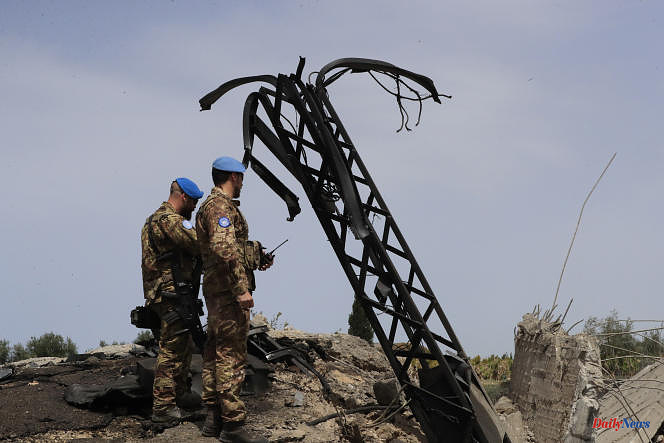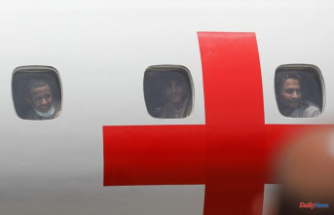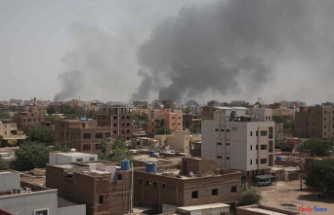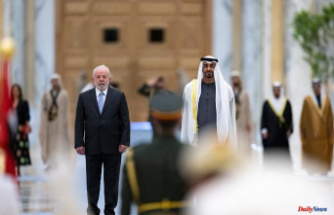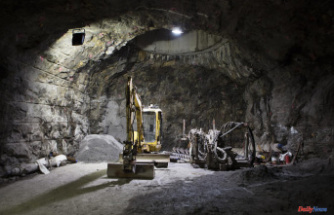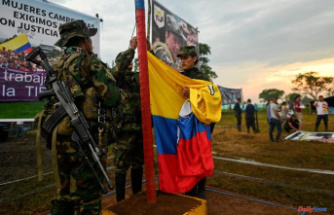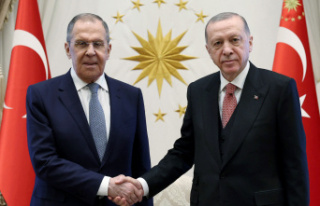Tension escalated overnight from Thursday to Friday in the Middle East after Israel responded to rocket attacks on its territory fired from Lebanon, with strikes targeting Hamas positions in the south of the country as well as than in the Gaza Strip, following the violence at the Al-Aqsa mosque in Jerusalem. In response to the heightened tensions of recent days, the international community called on Friday, April 7, for "de-escalation" by "all parties".
London said it "condemns the rocket attacks from southern Lebanon and Gaza and recognizes Israel's right to self-defense," in a statement from British Foreign Minister James Cleverly. "Now is the time for all parties in the region to demonstrate de-escalation," the UK added, also calling for "upholding the historic status quo regarding Jerusalem's holy sites."
For its part, Paris recalled "its unwavering attachment to Israel's security and the stability and sovereignty of Lebanon" while reiterating "its firm condemnation of the indiscriminate rocket attacks that targeted Israeli territory from Gaza and southern Lebanon. ". France calls on "all parties to exercise maximum restraint and to avoid any action likely to lead to an escalation", added François Delmas, deputy spokesman for the Quai d'Orsay.
"We call on the parties concerned to refrain from confrontation and to take action to prevent further escalation, end the violence and restore a lasting ceasefire," the Russian Foreign Ministry also responded in a statement. .
Hamas struck on two fronts
Thursday, before Israel's nocturnal response, American diplomacy had denounced the firing of rockets from Lebanon and Gaza towards the territory of its Israeli ally and reiterated its "unfailing" support for the latter, adding that it recognized "the legitimate right of Israel to defend itself against any form of aggression. Mr. Guterres had also condemned the rocket attacks, calling on "all actors" for "maximum restraint" and insisting on the need "to avoid any unilateral action that could lead to a further escalation of the situation".
These strikes by Israel were carried out in response to the salvo of thirty-four rockets fired Thursday afternoon on its northern border, on the first day of Passover. Mostly intercepted by anti-aircraft defenses and unclaimed, these strikes are attributed by the Israeli army to Palestinian factions led by Hamas, an Islamist movement in power in the Gaza Strip since 2007.
His army therefore decided to retaliate by targeting this same enemy on two fronts: positions of Palestinian militants established in southern Lebanon, near the Rashidiya refugee camp, and rocket production and development sites, as well as the tunnels of the Hamas in the Gaza Strip. "We will strike our enemies and they will pay the price for each attack," Israeli Prime Minister Benjamin Netanyahu said shortly before the opening of a meeting of the restricted security cabinet.
It was the Gaza Strip, and the tunnels located in the territory, which were targeted first during the night from Thursday to Friday, around 11:15 p.m. (9:15 p.m. in mainland France), during a raid half an hour, one of them being in the area of Beit Hanoun, in the north of the Gaza Strip, then another in the area of Khan Younis, in the south. Then "two weapons manufacturing centers belonging to Hamas" were subsequently hit.
Condemning "in the strongest possible terms the appalling Israeli aggression against the besieged Gaza Strip and Lebanon," Hamas said it held Israel "fully responsible for the consequences of such grave aggression."
The Israeli army then announced at 4:07 a.m. Friday (2:07 a.m. in mainland France) that it was "carrying out strikes in Lebanon". At the same time, violent explosions were heard in the Tire region of southern Lebanon, near the Palestinian refugee camp of Rashidiye.
Violence amid Ramadan and Jewish Easter
This excess of violence occurred the day after the brutal irruption, in the middle of Ramadan, of the Israeli police in the Al-Aqsa mosque in Jerusalem, the third holiest site in Islam, and to which several Palestinian groups promised a response.
The Israeli police intervened inside the mosque, located in East Jerusalem, on Wednesday night, to bring out "agitators" who had, according to them, introduced "fireworks, sticks and stones", before proceeding to "more than 350" arrests on the esplanade of the Mosques. Hamas denounced in response "an unprecedented crime".
While the international community was already calling for appeasement, Mr. Netanyahu assured Thursday: "We have no intention of changing the status quo on the Temple Mount", a term that Jews use to describe the esplanade of the Mosques.
The United Kingdom condemns "the violence of the Israeli police at the Al-Aqsa mosque", in particular argued on Friday the head of British diplomacy in his press release. "When the Israeli security forces conduct their operations, they must ensure that they do so in a proportionate manner and in accordance with international law," he stressed.
Antonio Guterres again called for appeasement in a tweet, saying that "this year Ramadan, Passover and Passover coincide - an opportunity to come together for peace".
But a new attack took place in the occupied West Bank on Friday, killing two sisters from the Israeli settlement of Efrat, in their 20s, and seriously injuring their mother, Israeli sources reported.

